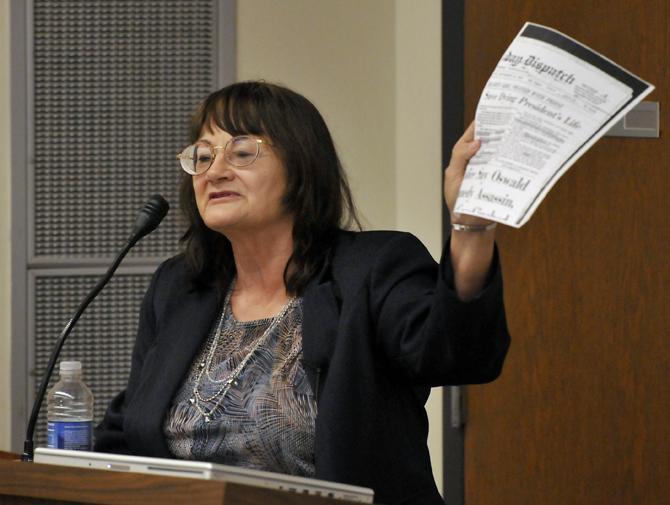Judyth Vary Baker, the lover of Lee Harvey Oswald, gave her perspective on the media’s treatment of Oswald since his death to a group of professors and community members at Loyola University on Saturday in New Orleans.
Citing an extensive collection of government records and personal accounts, Baker argued the government’s investigations of President John F. Kennedy’s assassination, of which Oswald was charged, were flawed.
Baker’s talk came in preparation for the 50th anniversary of Kennedy’s assassination on Nov. 22.
She came to New Orleans to give the discussion and promote her book, “Me and Lee: How I Came to Know, Love and Lose Lee Harvey Oswald.” Audience members received a book with their ticket purchase, and Baker signed copies throughout the day.
During her talk, Baker criticized newspaper reports that she said inaccurately portrayed Oswald as a mentally unstable communist. She mentioned that newspapers have never covered her story.
The Loyola symposium was her first public appearance in 10 years after living in Europe, claiming she moves every 90 days.
She implored the audience to question accepted knowledge about the assassination.
“You are the hope for the future,” Baker said. “Lee loved New Orleans.”
Baker said the city of New Orleans, where Oswald was born, was central to their relationship. She said she came to know Oswald while the two worked on a plot to kill Fidel Castro during one summer when she was 19.
Earlier in the week, Baker toured sites in New Orleans significant to her relationship with Oswald, such as the former offices of Reily Coffee Company and Oswald and Baker’s rendezvous locations.
Baker, who said she was a trained nurse, referred to the plot as a cancer research project. A review of Baker’s book said Baker and Oswald were attempting to create a “cocktail” of toxins that would infect Castro with cancer while they worked at “cover” jobs at the Reily Coffee Company in New Orleans.
During this time, Baker and Oswald became romantically involved, and Oswald gave her details of his defection to the USSR. Despite his involvement with the Fair Play for Cuba Committee and other communist – sympathizing groups, Baker insisted Oswald had always remained loyal to the United States.
“He was not a communist–he was a Marxist,” Baker said, explaining that Oswald agreed with the theory of Marxism but did not participate in communist activities.
Although Baker was not in Dealey Plaza when Kennedy was shot, she said she spoke with Oswald 37 hours before. She also said she watched Oswald’s shooting by Jack Ruby two days later.
“I couldn’t remember anything after he was shot,” Baker said.
She thoroughly argued Oswald was medically mistreated after he was shot, presenting medical records that stated he was not given oxygen in the ambulance and was beat on his bullet wound to get him to confess.
Oswald’s girlfriend offers variation on JFK assassination
October 20, 2013
Judith Baker, author of “Me and Lee – How I came to know, love, and lose Lee Harvey Oswald,” presents an article at a symposium on Sat. Oct. 19, 2013 at Loyola University in New Orleans.




